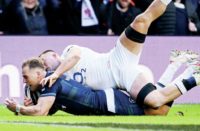 It's great when the season restarts and the politics takes second place and we can get on to actually playing and watching the game. For the majority of professional players it is business as usual, trying to stay fit and earning as many match-win bonuses as they can – but some have higher ambitions.
It's great when the season restarts and the politics takes second place and we can get on to actually playing and watching the game. For the majority of professional players it is business as usual, trying to stay fit and earning as many match-win bonuses as they can – but some have higher ambitions.
This year will be special for all who have dreams of playing for their respective countries in next year's World Cup, particularly if it is at the start or end of their international careers.
For a chosen few established players it will be about survival and how to make it through the season without injury, while still putting in acceptable levels of performance for their clubs.
For those on the fringe it all depends on opportunity and the chance to show what they can do, but they know that chance will only come if an established player is injured.
By now, most countries' head coaches will be thinking of a squad of players that, in an ideal world, they would like to take to the World Cup with one or two fringe players penciled in as injury cover – leaving all the hopefuls with a dilemma.
Do they play their socks off trying to be noticed and risk the chance of an injury that might make them miss an opportunity or do they follow the example of the chosen few and try to remain fit and ready for any call should it come?
I remember as a young player desperately waiting for an opportunity to show what I could do and the reassuring words of advice from my brother, “stay fit, if you're always available one day you'll get picked”. It took until I was nearly 31 but he was eventually proved right.
That makes this Premiership season something special because the majority of the elite players play for the clubs that usually occupy the top spots.
I say ‘usually' because history shows that the season before and the season immediately after a World Cup, the clubs that supply the majority of the England squad fail to perform at the expected levels, no matter how the national side does in the Cup.
That gives the usual ‘also ran' of the Premiership an opportunity to cause a bit of chaos as the established elite misfire.
The RFU's player release agreement limits the number of games that EPS members can play, so it is likely that clubs with big squads like Saracens will not be as badly affected as some of their rivals and for that reason I expect Sarries to have a couple of very good years on the domestic front and in Europe.
The disadvantage for other nation's internationals in the Premiership is obvious as they will have to play the whole of the season without breaks, which will be of concern to the head coaches of their home nations.
The likes of Warren Gatland and Vern Cotter will be watching and hoping that those stars that have chosen to ply their trade outside the Welsh and Scottish borders can keep fit and fresh for the Cup, despite what will be a full programme of games both here in the Premiership and in the Top14 in France.
As peace between club and country breaks out across the game it has bought the focus back to where it should be – on the pitch.
The encouragement for referees to use the TMO less and rely on their own instincts sounds like a positive move to keep the game flowing but I am not sure it will work.
As I have said before, the main reason for the apparent over-use of the TMO is the level of criticism that is directed at referees from coaches and the media if it is perceived that the match officials have made a mistake and unless there is an agreement for that to be reduced (which I don't believe is possible) any respite is likely to be short lived.
The puzzle is, why, when the authorities have asked the referees not to refer to the TMO so much, they have also changed the way that a forward pass is defined?
I know I am a prop forward (you never retire as a prop – you just get slower and fatter) but to me a forward pass is simple to define, it is a ball that travels forward from where it was passed on the pitch and has nothing to do with the position of the hands.
The new definition, the direction of the ball leaving the hands, is just as confusing and difficult to interpret as the old one of the position of the hands when passing.
Are referees now expected to have a working knowledge of Einstein's theory of relative motion before being able to tell if a ball has been passed forward or not?
If so, then what constitutes a forward pass would depend on whether the passer was stationary or running and at what speed relative to the receiver.
The referee's movement and position would also have to be taken into consideration as his perception of the angle of the pass would be influenced by where he is relative to the players on the pitch.
Much simpler is for the referee to ask the TMO to look at an over-head shot and see if the ball travels forward.
*This article was first published in The Rugby Paper on September 7.




























Pingback: Public Health Degree in Africa
Pingback: find this
Pingback: tubulatura exhaustare